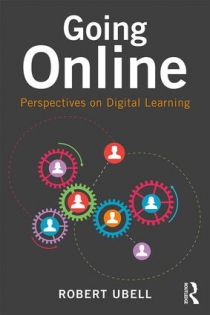From Correspondence Courses to the Cutting Edge of Digital Learning
Bob Ubell, Tandon’s Outgoing Vice Dean of Online Learning, Publishes New Book on Digital Education

It would not be accurate to say that Bob Ubell has had a front-row seat as the field of online learning has burgeoned in sophistication, effectiveness, and popularity. Widely acknowledged as one of our most respected leaders of online learning, Ubell has not simply been in the audience; he has played a major role on stage.
The recipient of the A. Frank Mayadas Leadership Award, a prestigious honor given by the Online Learning Consortium, Ubell has spearheaded initiatives that have garnered Tandon a slew of similarly impressive accolades. The Online Learning Consortium has presented it with the Ralph E. Gomory Prize for Quality Online Education in recognition of its stellar track record, which includes a 96% course-completion rate.
Now, Ubell, who has been the principal investigator on projects that have attracted nearly $3 million in grants from the National Science Foundation, Sloan Foundation, IEEE Foundation, and McGraw-Hill, among other sources, is adding another accomplishment to his CV: the publication of his latest book, Going Online: Perspectives on Digital Learning. The volume explores exactly how online learning works and how it developed — a trajectory that began back in the days when students enrolled in correspondence courses conducted by mail.
 Aimed at fellow educators, the book includes chapters on how to build a sustainable online program, the importance of peer-to-peer and collaborative learning, and how to use data analytics to improve the quality of the instruction, among other vital topics. (One chapter, on how to create an active-learning environment that invites participation, was written by Ubell’s colleague John Vivolo, director of online and virtual learning.)
Aimed at fellow educators, the book includes chapters on how to build a sustainable online program, the importance of peer-to-peer and collaborative learning, and how to use data analytics to improve the quality of the instruction, among other vital topics. (One chapter, on how to create an active-learning environment that invites participation, was written by Ubell’s colleague John Vivolo, director of online and virtual learning.)
Going Online is already generating buzz in the academic world, with excerpts published in such well-regarded media as The Chronicle of Higher Education and Inside Higher Ed. One of the chapters attracting the most attention, “What You Can Do Online, But Not on Campus,” details some of the advantages of learning in a virtual classroom — among them partial anonymity. “Stepping into your class on campus, you’re on display — everybody sees you and can easily form an impression of who they imagine you are, perceptions based merely on how you look,” Ubell writes. “Your classmates immediately know your gender, your race ... They know whether you’re tall or overweight, the color of your hair and eyes, or if you’re physically challenged. Long before you speak, your presence presents your instructor and peers with a complex, if quite limited, picture of who they think you are.”
That limited picture can lead to unconscious — or even overt — bias. Ubell quoted one African-American student, a middle-aged single mother living in Tennessee, who said that she had often felt judged for her skin color in school but that when taking online courses she thought, “I can do this. There is no one stereotyping me.”
Ubell observes, “In daily life you can often tell who hold positions of status by the way they dress, how they carry themselves, the way they speak, among other easily acknowledged signs of authority. Online, however, nearly all those cues fall away. Since everyone online participates on an equal footing, no matter how influential some are, their authority in virtual space carries much less weight.” Ubell just delivered a lecture on this chapter at Columbia University and will read an excerpt from it at NYU’s Stern School of Business on February 1, 2017.
Ubell touches upon another important advantage as well: the possibilities posed by data analytics. “Unless you videotape your on-campus class, what happens inside the schoolroom is rarely captured, except by frenzied students taking obsessive notes,” he writes. “Like water running from a tap down the drain, on-campus student data disappears at the end of each class, escaping the process of gathering and measuring what goes on.” By contrast, Ubell explains, course-management systems and other types of educational software uncover the digital evidence of student participation (how often they log on and how much of the course material they read, for example), quiz results, discussion-board posts, and more. Analyzing that data can reveal how well students are learning, what pedagogical methods are most effective, and other metrics by which an instructor can fine-tune curriculum.
Ubell, who will remain at the School of Engineering as senior advisor to Dean Katepalli Sreenivasan, after stepping down as vice dean at the end of the year, asserts that technological innovation, coupled with innovative new pedagogies, are transforming the face of education. His stewardship of NYU Tandon Online, which saw enrollments increase nearly 400% over the last decade, definitely seems to bear out that assertion.




